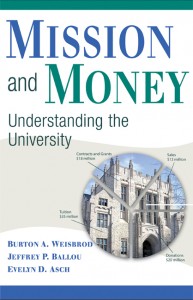Writing for the San Francisco Chronicle, authors of Mission and Money Burton Weisbrod and Evelyn D. Asch reveal the incentives that steer college coaches in directions that may be at odds with the institutional mission.
Pity the college football coach. With all those talented student-athletes, how much energy and time should he spend on the student versus the athlete?
 For any coach at the 120 universities playing big-time football, the choice is easy if he does what the school’s contract rewards.Contracts specify “performance-based” bonuses, and so we examined coaches’ contracts to answer the question: How do football coaches’ rewards for winning games, attending to the athlete, compare with their rewards for advancing the student toward graduation? There’s no contest.No one is surprised when a corporation talks about its devotion to the social good but then pays its CEO bonuses for raising profits. Likewise, it should be no surprise that despite talk about education, coaches are paid to win games. But it may be surprising how clear the contracts are in specifying what it takes for a coach to get bonuses.Under state Freedom of Information acts, we obtained contracts from 70 public universities playing big-time football. The University of Florida contract with its football coach, Urban Meyer, for example, rewards him generously for players’ athletic success: for getting to his conference championship game, he receives $37,500. For getting to even a minor bowl game, another $37,500. For playing in any of the four major bowls – Fiesta, Orange, Rose or Sugar – the coach is given a hefty $100,000.For stellar athletic performance – winning his conference championship, winning the national championship, being named national and conference coach of the year, and finishing in the top 10 of the Associated Press or USA Today coaches’ polls – Meyer can make $450,000 in bonuses.
For any coach at the 120 universities playing big-time football, the choice is easy if he does what the school’s contract rewards.Contracts specify “performance-based” bonuses, and so we examined coaches’ contracts to answer the question: How do football coaches’ rewards for winning games, attending to the athlete, compare with their rewards for advancing the student toward graduation? There’s no contest.No one is surprised when a corporation talks about its devotion to the social good but then pays its CEO bonuses for raising profits. Likewise, it should be no surprise that despite talk about education, coaches are paid to win games. But it may be surprising how clear the contracts are in specifying what it takes for a coach to get bonuses.Under state Freedom of Information acts, we obtained contracts from 70 public universities playing big-time football. The University of Florida contract with its football coach, Urban Meyer, for example, rewards him generously for players’ athletic success: for getting to his conference championship game, he receives $37,500. For getting to even a minor bowl game, another $37,500. For playing in any of the four major bowls – Fiesta, Orange, Rose or Sugar – the coach is given a hefty $100,000.For stellar athletic performance – winning his conference championship, winning the national championship, being named national and conference coach of the year, and finishing in the top 10 of the Associated Press or USA Today coaches’ polls – Meyer can make $450,000 in bonuses.
But what does Meyer’s contract say about student-athletes graduating? The contract is vague, saying he may be rewarded for players’ academic success, but there is no mention of how much. Subject to such incentives, would a coach concentrate on winning or would he sacrifice practice time to spur players to graduate?
OK, but how typical is Florida’s financial reward structure? Very.
Latest Comments
Have your say!